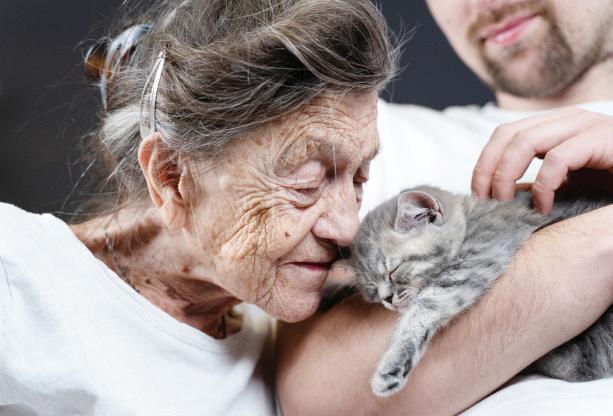
4 minute read
Caregivers Corner
CAREGIVERS O R N E R
By Kathy Cocks, RN
Considering a new furry friend?
Research has shown that pets provide a tremendous amount of physical and emotional benefits to older adults. A pet owner gets physical activity by providing essential care to the animal and as a side benefit a more structured daily routine.
Pet owners also have greater emotional well-being. When my dad had open-heart surgery, he found the recovery time lonely because he could not get out. He adopted two cats. He became so much happier. Just grooming and taking care of an animal gives meaning and purpose to life. I am glad he got the cats. When the pandemic hit we were trying to keep my dad at home more to protect him, his cats kept him company. Pets also give you something to talk about with other people. I can remember calling my mom and sometimes we ran out of things to talk about. I know when I call dad, he can always tell me about the cat’s antics and routines.
Even though a pet can be beneficial to an older adult, one must evaluate their living situation. Mr. Sims had dementia. He also had two dogs.
The problem was that he kept feeding the dogs because he had forgotten that he had already fed them for the day.
Older adults need to be able to give their pets food, water and attention. It is also helpful if pets especially dogs can get some exercise. Choosing a pet that matches your physical ability and activity level is crucial. A neighborhood teenager could be hired to assist if that is something hindering an older adult from getting a pet.
Another issue to consider is safety. Many times smaller pets can get underfoot and not be as easily seen and a larger animal due to their size could bump into their owner both scenarios create a potential fall risk. The behavior, grooming needs and demeanor of the potential pet must be considered.
As a pet owner, you must be able to bend down to provide food, water and clean up any potential messes. If you cannot bend easily a cat might be an option because food and water can be placed on an elevated surface. Most felines can self-groom and with the invention of self-scooping liter boxes, even that necessary task is more manageable.
Tending to the basic needs of an animal boosts your activity level. Even the act of filling a water dish requires walking and stretching which is a low-impact way to improve your physical health.
Most shelters encourage an older person to adopt an older animal who is more willing to lounge around and isn’t quite as rambunctious. Some shelters will allow older individuals to foster older pets since they are much harder to get adopted. If the animal proves to not be a good fit the shelter will be able to take the pet back. In this situation make sure you or someone can take the animal to vet visits as older animals may require more medical checkups.
A few final things to consider do you have a plan in place if your pet can no longer live with you in your home? Whether due to your or their declining health or if the need arises for a care option outside of your home. Mrs. White had two cats, but she was having increased difficulty taking care of herself. She was hesitant to move because she did not know what to do with her cats. Fortunately, many senior communities do allow pets if you can continue caring for your animal. You could still move with your pet, but you may have to hire someone to help with pet care.

Studies have shown that pets provide physical, social and emotional benefits, especially to older individuals. Pet owners of all ages need to evaluate their budget and physical capability to ensure the pet is well taken care of. Pets can provide purpose and satisfaction in life. Another option is for a family member to get a pet and bring the pet over frequently. Many organizations also have therapy pets that they bring to your home.
Older adults should consider a furry friend if they can manage its care. An animal shelter or pet rescue may have your best new buddy waiting to come home with you. And you don’t have to limit yourself to only considering dogs and cats, feathered and finned pets provide their own form of companionship although not as snuggly.
This information comes from a podcast produced by Kathy Cocks to assist family members who have taken over some aspect of an older one’s care. https://knowledge-forcaregivers.simplecast.com/

www.psychologytoday.com/us/blog/fellow-creatures/201906/the-challenges-and-benefits-petownership-seniors Kathy Cocks, RN www.kathysconsulting.com 405-202-0708

info@kathysconsulting.com






